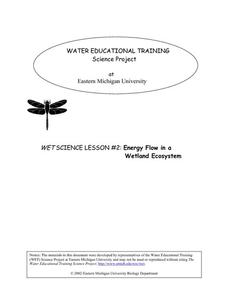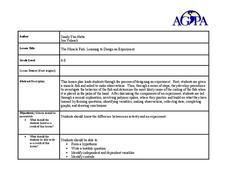Curated OER
Models of the Water Cycle
Pupils describe and review the stages in the water cycle. In groups, they build their own models of the water cycle and demonstrate where the water goes in a closed system. They answer discussion questions after the experiment to end the...
Curated OER
Creating the Water Cycle
Students create a terrarium to examine the stages of the water cycle. In small groups, they plant and water a seed in an enclosed plastic container. Each day they diagram and write observations of the terrarium using water cycle vocabulary.
University of Wisconsin
A Rain Garden Year
Pupils become plants in an interpretive play that depicts what happens throughout the seasons in a rain garden. As you narrate, young scholars bloom, flower, and go to seed accordingly. The lesson is first in a series of lessons written...
Teach Engineering
Photosynthesis—Life's Primary Energy Source
Wouldn't it be great if you could produce your own food? Scholars learn about the processes of photosynthesis and cellular respiration in plants. They consider how to use photosynthesis as a model of an efficient system and how to apply...
National Wildlife Federation
Penguin Fun Facts
What's black and white and can dive up to 1,800 feet under water? That's right, penguins! Learn this and many other amazing facts about these unique birds with this handy reference sheet.
Eastern Michigan University
Energy Flow in a Wetland Ecosystem
How is energy transferred within an ecosystem? What would happen to a food web if one of the organisms was removed? Elementary or middle school ecologists examine these questions and more in a comprehensive 5E learning cycle lesson....
Curated OER
The Miracle Fish: Learning to Design an Experiment
Learners develop procedures to explore the behavior of fish. For this scientific experiment lesson students from a hypothesis, write a question, identify different variables and controls in their experiment.








